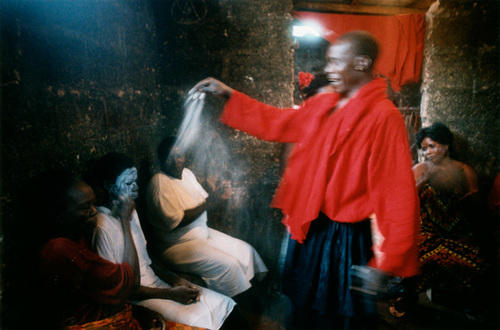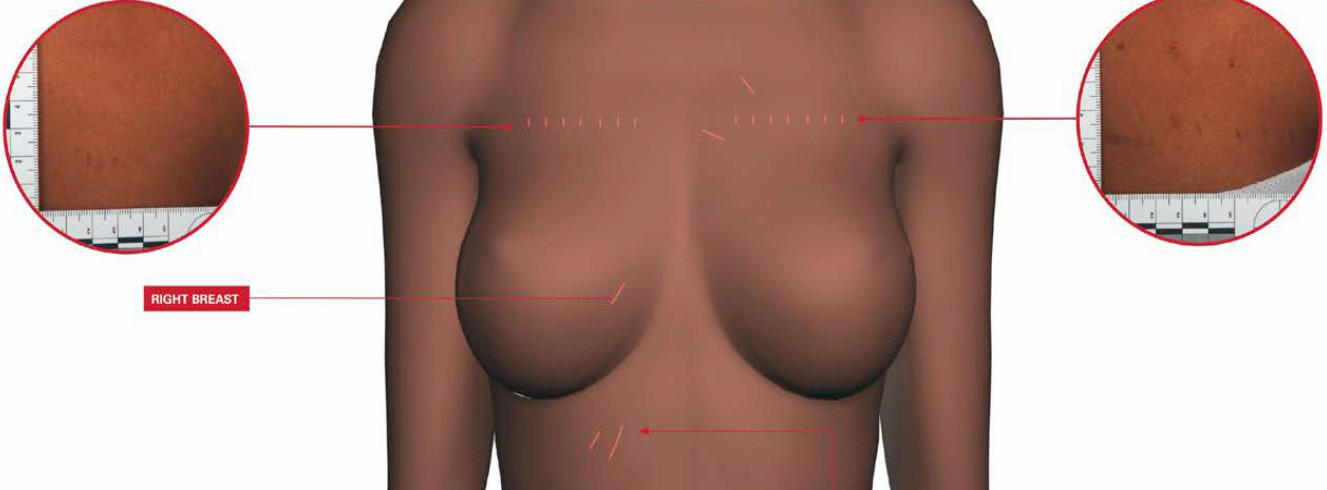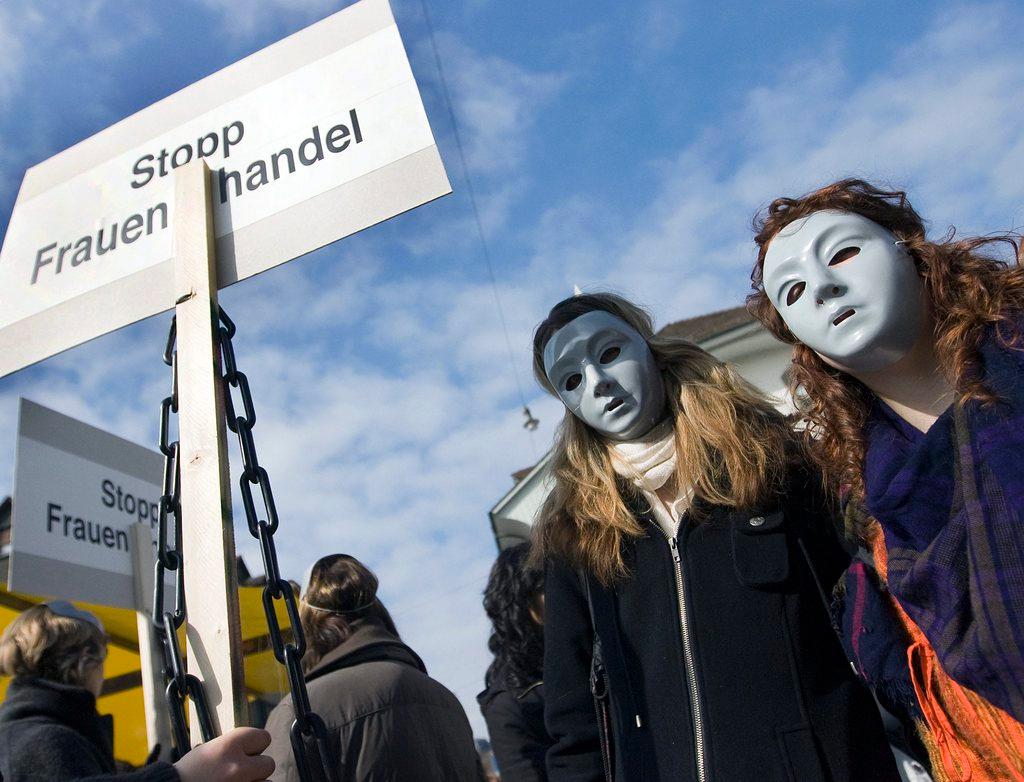In Europe, Nigerian prostitutes are held captive by ‘black magic’

Major European cities – including those in Switzerland – are playing host to a mysterious trend in which Nigerian migrants, convinced they are bewitched, are enslaved as prostitutes by networks of traffickers.
Social worker Gifty Amponsah, who is originally from Ghana but now lives in Biel, canton Bern, has met with several such women. Of the strategy honed by traffickers to enlist and hold young Nigerian women to a life of prostitution in Europe, she says: “The traffickers have found a way to always have girls. It’s a kind of strategic marketing”.
Amponsah works with Act212External link, a Swiss association dedicated to combatting human trafficking and committed to trying to help such women. The association has developed courses aimed at educating social workers, or workers from other organisations who encounter prostitutes, about the specific problem relating to Nigerian women. Often, it is difficult for western sensibilities to comprehend.
Stephan Fuchs, a specialist in Nigerian immigration and founder of the website trafficking.ch, explains how such a strange and difficult situation has developed. He says most of the young women come from one of Nigeria’s poorest regions, the state of Edo. The story often starts with meeting a ‘madam’, a person who is a pimp or ‘benefactor’ who promises them a job and a better life in Europe. Before travelling, however, the women must swear an oath and promise to repay the cost of the voyage to Europe.

Fear of dying
As a key part of enslaving the women once abroad, the traffickers conduct a black magic ritual – ‘juju’ – which has its origins in an animist religion in West Africa. During the ceremony a wizard extracts blood, nail clippings and pubic hairs from the young woman and mixes them with herbs. The wizard then cuts his own skin and places the mixture in the wound. Under the influence of an evil spirit, the victim now has no choice but to submit.
“The belief is so strong that these women are convinced that if they break the oath they will go crazy, get sick or even die,” explains Fuchs.
Arriving in Europe, the young Nigerian women are forced into prostitution until they repay their debt, which can be up to CHF70,000 ($70,410), according to Fuchs. It’s an amount that is greater than the real cost of the voyage to Europe, which often involves a life-threatening journey across the Mediterranean.
As such, the women work around the clock in miserable conditions, threatened and sometimes mistreated by the pimp.
“At around seven or eight euros per client in Italy, [the enslavement] could last around six years. In Switzerland, the rate is around CHF50 per client, so it goes a little faster,” says Fuchs. “All the money goes back to the madam. It is a flagrant case of human trafficking.”
Vicious circle
Once she has reimbursed the money, the young woman is freed from the juju and from her pimp. But without resources or prospects, many continue to prostitute themselves, while some become madams themselves using the same ploy to enslave new victims, says Fuchs.
It’s a vicious circle that is put in place and it’s very difficult to break. We need to send a signal and put these traffickers in prison,” he says.
Police and social workers sometimes feel helpless. Faced with Nigerian prostitutes who are paralysed into silence by fear of reprisals and of ‘bad things’ that could happen to them, it’s difficult to detect cases and help. For the same reasons, swissinfo.ch was unable to find a victim prepared to talk to us for this article.

“You can’t simply tell them not to believe in the juju, because they have always lived with these beliefs. You have to give them an alternative,” says Amponsah, adding that the solution is to propose a more powerful god “such as Jesus”.
“A lot of prostitutes sleep with a bible under their pillow – even if they don’t know how to read – to protect themselves from evil spirits,” she says.
Fuchs is sceptical when it comes to ways to convince victims that they can trust him without risk; trying to reason with these women is a mission impossible. The fear of the juju is so intense that some even develop psychological problems. He tells the story of a Nigerian woman who fell to the ground in a fit of convulsions. Taken to hospital, she could not remember anything, but the situation repeated itself several times.
“There have even been attempts to carry out counter rituals to break the spell but again, success is not guaranteed,” comments Fuchs.
Strong beliefs
Fuchs says informing and educating people in contact with prostitutes through courses is paramount.
“We should not under-estimate the beliefs of these women. We need to take them seriously and listen to them,” he says.
The phenomenon is most prevalent in countries that are the first port of call for migrants such as Italy, Spain, France or Portugal. In 2016, 11,009 Nigerian women arrived in Italy. The UN Migration AgencyExternal link estimates that 80% of them are victims of human trafficking.
“Switzerland is also concerned. However, there are no estimates [of how many women are involved]; no madam has yet been charged, but we are working on it,” says Fuchs.
The Zurich-based Centre for Advocacy and Support for Migrant Women and Victims of TraffickingExternal link (FIZ) identified 233 cases of trafficking in 2016 in Switzerland and estimates that 10% of victims came from Nigeria.
In Zurich, police are aware of the problem but to date no case has been legally proven.

“There are a lot of Nigerian prostitutes and we have evidence that certain situations could be the result of human trafficking. However, until now, no woman has been prepared to testify because they fear speaking about it,” says Markus Gähwiler, an investigator who specialises in human trafficking with Zurich’s cantonal police force.
Gähwiler says victims often do not trust the authorities or police. That’s why he also puts his hope in educating the various organisations that may have access to the victims.
“The social workers should not be afraid of coming to us with their suspicions. Zurich cantonal police have experts in human trafficking who are there to help,” he says.
According to the international definition, human trafficking is “the recruitment, transportation, transfer, harbouring or receipt of persons, by means of the threat or use of force or other forms of coercion, of abduction, of fraud, of deception, of the abuse of power or of a position of vulnerability or the giving or receiving of payments or benefits to achieve the consent of a person having control over another person, for the purpose of exploitation”. Victims could be objects of sexual exploitation, forced labour or organ trafficking.
As a country both of transit and destination, human trafficking also occurs in Switzerland. Most victims are sexually exploited for prostitution rings.
Cases are, however, difficult to detect. Scared of reprisals, victims are reluctant to denounce their persecutors. According to a 2002 estimate by the Swiss Federal Office of Police, the number of people in the country at risk for human trafficking for purposes of sexual exploitation is between 1,500 and 3,000External link (PDF in French).
Due to the high number of cases that go undetected, official police and justice figures remain small. In 2016, the Swiss police intervened in 125 cases of human trafficking, according to the Federal Statistics Office.

In compliance with the JTI standards
More: SWI swissinfo.ch certified by the Journalism Trust Initiative












You can find an overview of ongoing debates with our journalists here . Please join us!
If you want to start a conversation about a topic raised in this article or want to report factual errors, email us at english@swissinfo.ch.